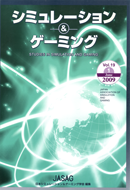Volume 19, Issue 1
Displaying 1-17 of 17 articles from this issue
- |<
- <
- 1
- >
- >|
Individual Papers
Refereed Papers
-
2009Volume 19Issue 1 Pages 1-8
Published: August 25, 2009
Released on J-STAGE: September 14, 2020
Download PDF (9382K) -
2009Volume 19Issue 1 Pages 9-16
Published: August 25, 2009
Released on J-STAGE: September 14, 2020
Download PDF (9531K)
Special Section: Simulation and Gaming in COE and GP Activities (4)
Invited Paper
-
2009Volume 19Issue 1 Pages 17-28
Published: August 25, 2009
Released on J-STAGE: September 14, 2020
Download PDF (9268K)
Special Section: Ethical Problems in Simulation and Gaming (3)
Invited Paper
-
2009Volume 19Issue 1 Pages 29-39
Published: August 25, 2009
Released on J-STAGE: September 14, 2020
Download PDF (547K)
SpecialSection: How Do We Evaluate Experience and Learning in the Gaming-simulation?
Refereed Papers
-
2009Volume 19Issue 1 Pages 41-46
Published: August 25, 2009
Released on J-STAGE: September 14, 2020
Download PDF (2984K) -
2009Volume 19Issue 1 Pages 47-59
Published: August 25, 2009
Released on J-STAGE: September 14, 2020
Download PDF (14580K) -
2009Volume 19Issue 1 Pages 61-72
Published: August 25, 2009
Released on J-STAGE: September 14, 2020
Download PDF (8699K) -
2009Volume 19Issue 1 Pages 73-86
Published: August 25, 2009
Released on J-STAGE: September 14, 2020
Download PDF (12728K) -
2009Volume 19Issue 1 Pages 87-99
Published: August 25, 2009
Released on J-STAGE: September 14, 2020
Download PDF (4453K)
Invited Papers
-
2009Volume 19Issue 1 Pages 101-111
Published: August 25, 2009
Released on J-STAGE: September 14, 2020
Download PDF (4172K)
Forum
-
2009Volume 19Issue 1 Pages 113-116
Published: August 25, 2009
Released on J-STAGE: September 14, 2020
Download PDF (5715K)
-
2009Volume 19Issue 1 Pages 117
Published: August 25, 2009
Released on J-STAGE: September 14, 2020
Download PDF (142K) -
2009Volume 19Issue 1 Pages 118
Published: August 25, 2009
Released on J-STAGE: September 14, 2020
Download PDF (149K)
-
2009Volume 19Issue 1 Pages 119-120
Published: August 25, 2009
Released on J-STAGE: September 14, 2020
Download PDF (378K)
Reports
-
2009Volume 19Issue 1 Pages 121-127
Published: August 25, 2009
Released on J-STAGE: September 14, 2020
Download PDF (848K)
From the Editorial Committee
-
2009Volume 19Issue 1 Pages 128-133
Published: August 25, 2009
Released on J-STAGE: September 14, 2020
Download PDF (8464K)
Editor's Note
-
2009Volume 19Issue 1 Pages 134
Published: August 25, 2009
Released on J-STAGE: September 14, 2020
Download PDF (1564K)
- |<
- <
- 1
- >
- >|
